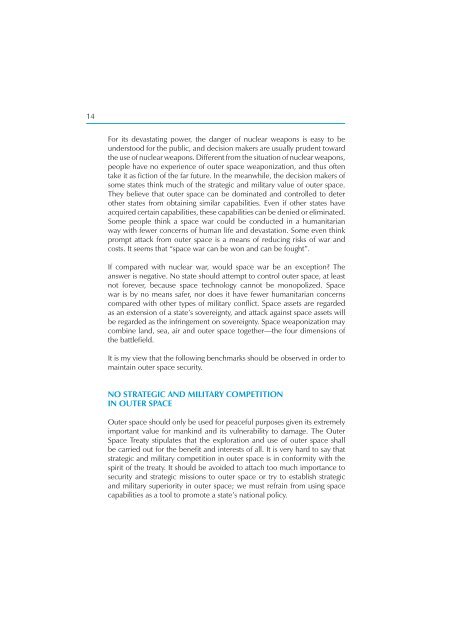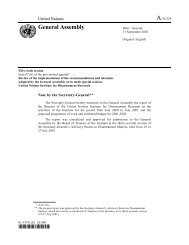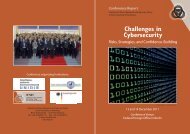Security in Space The Next Generation - UNIDIR
Security in Space The Next Generation - UNIDIR
Security in Space The Next Generation - UNIDIR
Create successful ePaper yourself
Turn your PDF publications into a flip-book with our unique Google optimized e-Paper software.
14<br />
For its devastat<strong>in</strong>g power, the danger of nuclear weapons is easy to be<br />
understood for the public, and decision makers are usually prudent toward<br />
the use of nuclear weapons. Different from the situation of nuclear weapons,<br />
people have no experience of outer space weaponization, and thus often<br />
take it as fi ction of the far future. In the meanwhile, the decision makers of<br />
some states th<strong>in</strong>k much of the strategic and military value of outer space.<br />
<strong>The</strong>y believe that outer space can be dom<strong>in</strong>ated and controlled to deter<br />
other states from obta<strong>in</strong><strong>in</strong>g similar capabilities. Even if other states have<br />
acquired certa<strong>in</strong> capabilities, these capabilities can be denied or elim<strong>in</strong>ated.<br />
Some people th<strong>in</strong>k a space war could be conducted <strong>in</strong> a humanitarian<br />
way with fewer concerns of human life and devastation. Some even th<strong>in</strong>k<br />
prompt attack from outer space is a means of reduc<strong>in</strong>g risks of war and<br />
costs. It seems that “space war can be won and can be fought”.<br />
If compared with nuclear war, would space war be an exception? <strong>The</strong><br />
answer is negative. No state should attempt to control outer space, at least<br />
not forever, because space technology cannot be monopolized. <strong>Space</strong><br />
war is by no means safer, nor does it have fewer humanitarian concerns<br />
compared with other types of military confl ict. <strong>Space</strong> assets are regarded<br />
as an extension of a state’s sovereignty, and attack aga<strong>in</strong>st space assets will<br />
be regarded as the <strong>in</strong>fr<strong>in</strong>gement on sovereignty. <strong>Space</strong> weaponization may<br />
comb<strong>in</strong>e land, sea, air and outer space together—the four dimensions of<br />
the battlefi eld.<br />
It is my view that the follow<strong>in</strong>g benchmarks should be observed <strong>in</strong> order to<br />
ma<strong>in</strong>ta<strong>in</strong> outer space security.<br />
NO STRATEGIC AND MILITARY COMPETITION<br />
IN OUTER SPACE<br />
Outer space should only be used for peaceful purposes given its extremely<br />
important value for mank<strong>in</strong>d and its vulnerability to damage. <strong>The</strong> Outer<br />
<strong>Space</strong> Treaty stipulates that the exploration and use of outer space shall<br />
be carried out for the benefi t and <strong>in</strong>terests of all. It is very hard to say that<br />
strategic and military competition <strong>in</strong> outer space is <strong>in</strong> conformity with the<br />
spirit of the treaty. It should be avoided to attach too much importance to<br />
security and strategic missions to outer space or try to establish strategic<br />
and military superiority <strong>in</strong> outer space; we must refra<strong>in</strong> from us<strong>in</strong>g space<br />
capabilities as a tool to promote a state’s national policy.








